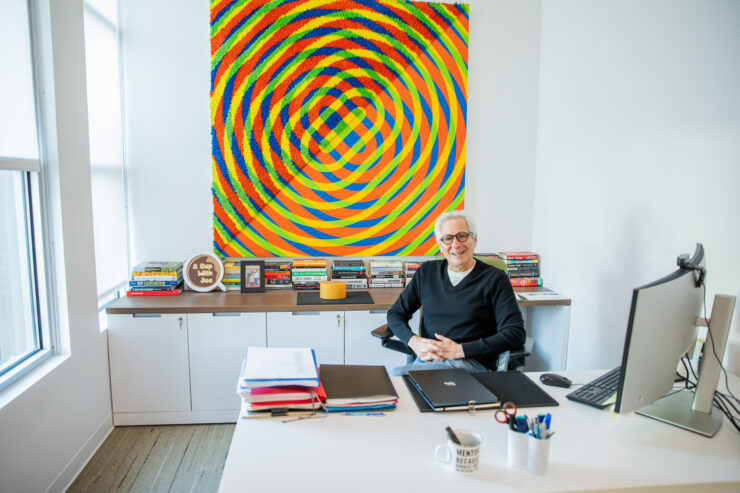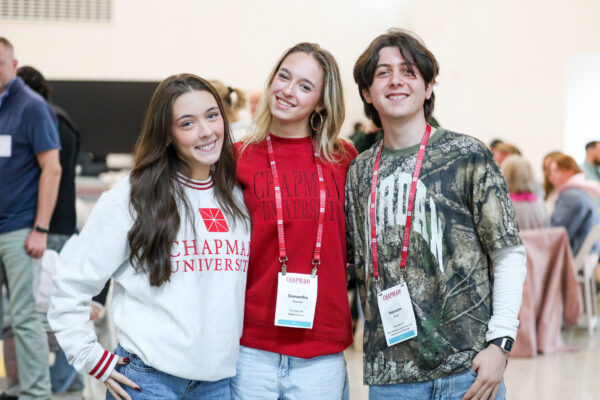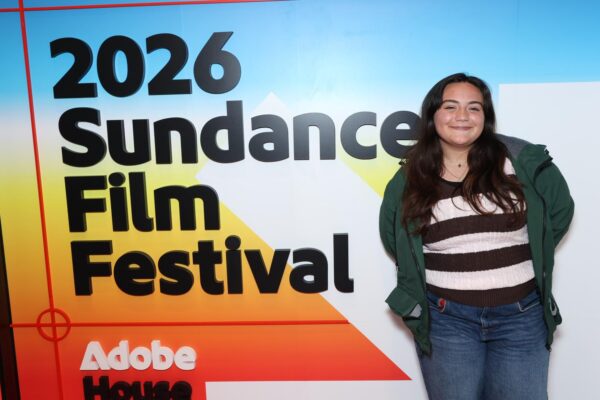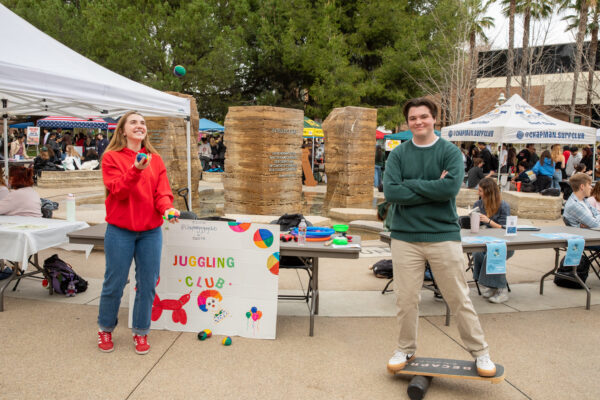Joe Rosenberg spent 25 years as an agent—the last 10 at Creative Artists Agency (CAA)—representing directors like Ridley Scott and David Fincher. Now he gives the treatment once reserved for Hollywood’s elite to students at Chapman University’s Dodge College of Film and Media Arts, connecting them with internships, jobs, and industry access before they graduate.
On Wednesday afternoons around 3 p.m., you’ll find him across a desk from a student. Door open. Discussing not just what jobs exist, but what scares them about applying.
Building Industry Pathways
In 2021, Dodge College opened a career center with a straightforward mandate: help students land internships and jobs, not after they graduate, but while they’re still on campus.
Today, Rosenberg and founding team members Katie Bottinelli and Susie Landau Finch lead a six-person operation in the Marion Knott Studios, connecting students with major studios and bringing talent to campus. Over the next few weeks, Dwayne Johnson and Jeremy Allen White will meet with students—visits arranged by Trustee Professor Scott Feinberg, who hosts of the Hollywood Reporter’s Awards Chatter podcast.
Chapman inverts the normal trajectory. Most students spend years building credentials before meeting industry leaders. Here, freshmen meet Jeremy Allen White, then spend four years proving they deserve that access.
“If there’s a job in the industry—whether it’s in production, marketing, data, or AI—why shouldn’t they choose a Chapman student?” Rosenberg says. “If there’s an open opportunity, I want to fill it with a Chapman student.”
Instead of representing a few directors, he represents hundreds of students who wouldn’t meet these people until years into their careers. If ever.
Beyond advising, Rosenberg works with Dean Stephen Galloway—whose support has been instrumental in building the center—and Feinberg and Landau Finch on the master class series and industry outreach. The center maintains a database of industry jobs and connects students with alumni. The staff includes peer advisors—upperclassmen who landed internships and now help younger students do the same.
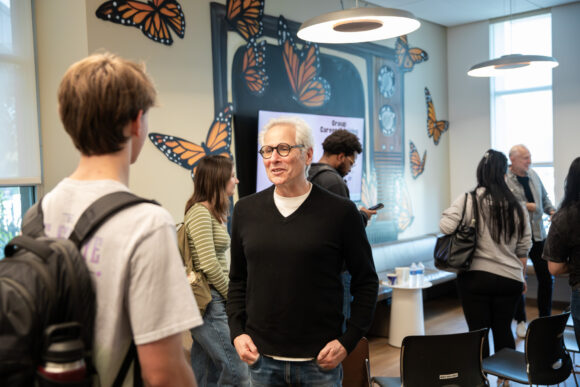 The CAA Foundation
The CAA Foundation
The blueprint came from CAA. Culture wasn’t just important. It was everything.
“At CAA, Richard Lovett, one of my mentors and now the company’s president, coined a phrase: ‘We take care of each other and good things happen,'” Rosenberg explains. “That philosophy shaped everything I do.”
He learned to ask: What am I bringing, not just what am I getting? That relationship capital—goodwill earned through generosity—could be spent on behalf of clients when it mattered.
“Their dreams became my dreams,” Rosenberg says. “I learned how to advocate for others. That’s what I’m doing now, just for a different set of clients.”
The Power of Connection
Those principles shape how the career center operates. Entertainment is a relationship business. Generosity and strategy aren’t opposites.
This summer proved it.
Michael Pruss, a Chapman alumnus and Ridley Scott’s producing partner, came to campus for a Q&A. One of Rosenberg’s peer advisors heard Pruss mention he’d be in Italy producing Scott’s next film.
Rosenberg requires students to send thank-you notes to guest speakers and to copy him—not to police them, but to advise on follow-ups when opportunities emerge.
This student went further. She mentioned she’d be in Italy with family and asked about a production assistant opportunity.
“You send a thank-you note because it’s the right thing to do. It’s good manners and Hollywood etiquette,” Rosenberg explains. “But you’re also politely hustling. That acknowledgment can become the beginning of a relationship, and you never know what opportunities might follow.”
Pruss said yes. The student spent her summer as a production assistant on a Ridley Scott film.
Two weeks ago, she started at CAA.
That student didn’t act alone. She’d worked as a peer advisor in the career center. She’d practiced her approach with Rosenberg the week before—testing language, working through worst-case scenarios. When Pruss said yes, she ran to Joe’s office.
It shows students that access isn’t mystical. It’s methodical.
“We’ve always had a startup mentality, but now we’re Career Center 2.0,” Rosenberg says. “We’re still nimble, we embrace disruption, but we’re maturing in how we operate. Dean Galloway has given us a clear mandate: prepare students not just for what’s happening now, but for the future. That flexibility is our advantage.”
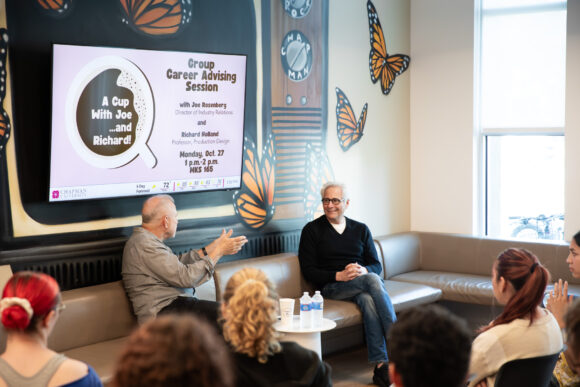 Looking Forward
Looking Forward
Rosenberg’s next priority: making Michael Pruss stories repeatable. The center is hosting alumni events in Los Angeles and New York while connecting with Chapman graduates at studios, agencies, and streaming platforms.
That means understanding how AI creates roles like prompt engineers, how data analytics opens positions like audience insights strategists, and how streaming expands opportunities beyond Hollywood.
He teaches adaptability. One student wants to be a showrunner but doesn’t want to start as a writers’ assistant. Rosenberg doesn’t talk them out of their dreams. He shows them the path requires detours.
Wednesday afternoons, Rosenberg sits with students discussing their goals—producing documentaries, running streaming platforms, creating international content. He knows their names. He knows what scares them.
The best part of his week: a student walking in to say “Joe, I got it.”
After 25 years making deals for Hollywood directors, Rosenberg found something better. At CAA, he made hundreds of deals. Here, he’s building something that will generate thousands of opportunities he’ll never track. Students he’s never met will benefit from the systems he’s creating.
The career center will outlive him. The students he advises today will mentor others tomorrow.
“The only thing that’s important is doing a great job for our students,” Rosenberg says. “When they become alumni, we’re still in service to them. That’s the commitment, and that’s what makes this work meaningful.”
Quick Fire with Joe Rosenberg
12 Questions with Chapman’s Hollywood Connection
Q: It’s Wednesday at 3 p.m. Where are you and what’s the conversation?
JR: Advising meeting with a student. Which internship they’re doing next semester or what their dream job looks like.
Q: What do people think your job is versus what it actually is?
JR: They think resume advice. We’re hosting Dwayne Johnson, tracking AI jobs that don’t exist yet, connecting students with Ridley Scott’s producing partner. Way more.
Q: The thing in your office most likely to start a conversation?
JR: The cup that says “A Cup with Joe.” Monthly series—50 students, coffee, talk about the business. A Chapman builder made it for me.
Second place: the Jim Iserman painting. He was painting my house to make rent when he started out. I bought it at his first show.
Q: Most rewatchable movie—not favorite, but the one you keep coming back to?
JR: Godfather Part II, Goodfellas, Shampoo, or Chinatown. Can’t pick one.
Q: Biggest surprise about Chapman culture?
JR: Feels like a small town—you know everybody from the president down. But we’re the #4 film school in the world and an hour from Hollywood. That shouldn’t be possible.
Q: The unwritten rule you learned the hard way?
JR: Always check before reaching out to someone in the industry. “Do you know this person?” People are territorial about relationships.
Q: What are you determined to change over the next year?
JR: Build the alumni network bigger—New York, Atlanta, more LA events. And figure out where the jobs will actually be in three to five years.
Q: AI and film: Big deal, small deal, or no deal?
JR: Big deal. We just don’t know what it looks like yet. Could be great jobs for our students if we prepare them right.
Q: The student interaction that made your whole week?
JR: “Joe, I got the job.”
Q: When friends from outside Chapman ask “So how’s the job?”, what’s your go-to response?
JR: I’m part of something bigger than myself.
Q: Best advice for someone starting in your role?
JR: Listen more than you talk. Ask what you’re bringing, not what you’re getting.
Q: You get to write one all-campus email and everyone has to read it. What’s the subject line?
JR: Stay positive.
